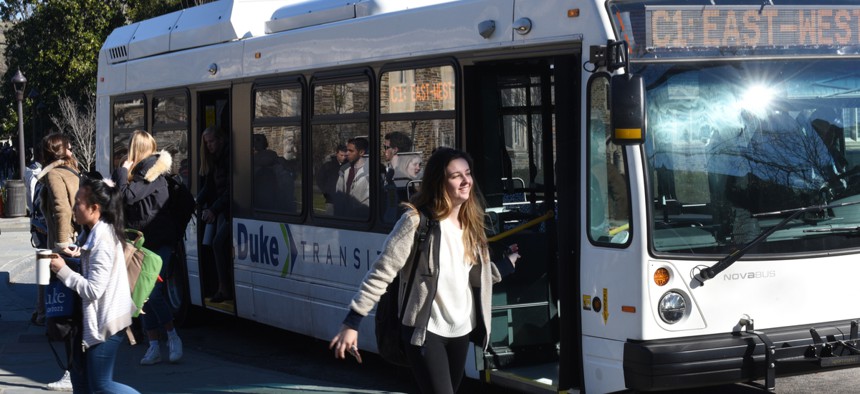A Light-Rail Project Hits a Higher-Ed Roadblock

Duke officials said they still had questions about how the project would affect patient care at medical facilities, among other things. Shutterstock

Connecting state and local government leaders
Duke University declined to sign a collaborative agreement necessary to secure federal funding for the North Carolina project.
Duke University this week declined to sign a cooperative agreement for a planned light-rail project, jeopardizing federal funding and forcing local officials to explore other options, including seizing land by eminent domain.
In a letter dated Feb. 27, Duke officials told the president of GoTriangle transit agency that the university continued to have concerns despite a lengthy and collaborative planning process on the proposed project.
“Significant efforts by many people from Duke and GoTriangle have been made over the past year to resolve a number of critical issues connected to the proposed Durham-Orange Light Rail Transit (DOLRT) project,” the letter says, while adding that university leaders weren't able to resolve their concerns in time to meet federal and state deadlines.
The 17.7-mile Durham-Orange Light Rail Transit project, expected to begin operation in 2028, would connect Chapel Hill and Durham, N.C., with stops at Duke, the University of North Carolina-Chapel Hill and multiple medical facilities. Its placement would skirt several major hospitals and research labs, a sticking point for officials at Duke who said they still had questions about how the project could affect medical equipment and patient care, among other things.
“The DOLRT is a complex undertaking that has only become more complicated as we have mutually sought to address the numerous technical and financial challenges that come from attempting to place an elevated electric rail line within 150 feet of the most densely concentrated corridor of patient care and biomedical research facilities in the state,” the letter says. “I know you understand that Duke’s highest priority is the health and safety of patients who have entrusted us with their care at the most perilous times of their lives. The acceptable tolerance for risk in these circumstances must be as close to zero as possible, and we have an obligation to our patients and the community to uphold that standard.”
Unresolved issues include potential electromagnetic interference, vibrations, disruption to power and other utilities and resulting liability, as Duke is a private institution, officials wrote.
The decision was disappointing, GoTriangle officials said, as the two entities had worked closely together for years to mitigate potential issues.
“For more than a decade, and more intensely over the past year, GoTriangle and local elected officials have worked closely with the university to address concerns so Duke’s action today is especially disappointing. This is a major setback for the Durham and Orange county communities and the entire Triangle region,” the agency said in a statement on its website. “GoTriangle will work with the elected officials in Durham and Orange counties and the Federal Transit Administration to assess all available options and decide upon a course of action.”
Duke’s agreement was one of three outstanding documents needed to secure federal funding for the project. The other two are from railroad companies who have said they require more detailed information about how the light rail would move along existing tracks. All local funding commitments must be made by the end of April, according to state legislators.
Duke’s refusal throws the project into jeopardy and exacerbates existing tensions between the university and the city of Durham, City Councilman Charlie Reece said on Twitter.
“Duke’s decision to kill the light rail project sadly reinforces the worst fears of many Durham residents—that Duke University is an arrogant and elitist enclave with little interest in being the kind of partner this city needs,” he tweeted.
Another city council member suggested taking the land by eminent domain if Duke continues to refuse to cooperate with the project.
“I don’t want to hear any more bellyaching from GoTriangle, nor prompting or cajoling from public officials about black folk going hat in hand to Duke begging for our economic future while not boldly and redemptively using the power that made us beggars in the first place,” Mark-Anthony Middleton wrote in an op-ed for IndyWeek. “We’ve heard the case; now show us how serious you really are.”
That option is one of many on the table, Durham Mayor Steve Schewel said in emails obtained by the Raleigh News & Observer.
“Duke’s decision not to sign the cooperative agreement is a terrible blow to this project and our community,” Schewel wrote to a constituent on Thursday. “The GoTriangle board of directors is looking at all of its options, including eminent domain, as I have informed President Price of Duke.”
Kate Elizabeth Queram is a Staff Correspondent for Route Fifty and is based in Washington, D.C.

NEXT STORY: JEDI delays complicate DOD cloud momentum




